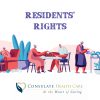October is Residents’ Rights Month! This observance was created by the National Consumer Voice for Quality Long-Term Care, in order for care center residents and their families to be able to make informed decisions about their lives, and access high quality care.
It doesn’t matter where a senior lives – he or she has the right to make personal decisions about healthcare and how he or she wants to live. Senior communities help with ensuring seniors know their rights and can make changes as necessary. For example, most care communities provide residents with a service plan. This outlines the services, timing and frequency of those services, who is providing these options and how care is delivered while residing in the community.
Too many people think that once a senior is in a care community, he or she loses independence and personal rights. The truth is, the community staff do not have control over residents’ lives. Instead, they foster autonomy and wish to assist seniors in any way possible.
What if the senior cannot make important decisions?
While seniors have rights when living in a health care community, those rights may be waived if they are not in the right mental state to make important decisions. The staff does not take on this responsibility. Instead, health care choices, end-of-life plans and estate planning are all done by a person the senior has deemed with power of attorney. If seniors have not taken this important step, their loved ones may need to establish guardianship or speak with the senior’s lawyer to gain legal control to assist the senior. Many states have individual bills of rights pertaining to seniors to ensure they can maintain independence as long as possible and then explaining what happens once a senior can no longer manage his or her own affairs.
What to know about a senior resident’s basic rights:
When a senior moves into an assisted living, skilled nursing or independent living community, he or she (and/or the person’s designated representative) receives a copy of the resident’s rights. This list should outline very important aspects the senior and/or caregiver should know about residing in the community. Some examples of such rights include:
- To receive medical care and personal assistance that is administered with respect and attention to the resident’s privacy and personal needs
- To receive information about service costs
- To participate in his or her own care plan and make changes as necessary
- To feel safe and make decisions with all the information at hand
- To access any personal records within a set time frame as legally designated for medical and financial purposes

Each senior community has its own rights, but they should all promote the autonomy and well-being of all residents.
If you found an error, highlight it and press Shift + Enter or click here to inform us.



